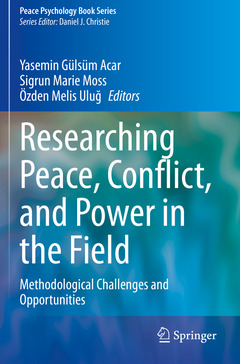Description
Researching Peace, Conflict, and Power in the Field, 1st ed. 2020
Methodological Challenges and Opportunities
Peace Psychology Book Series
Coordinators: Acar Yasemin Gülsüm, Moss Sigrun Marie, Uluğ Özden Melis
Language: English
Subject for Researching Peace, Conflict, and Power in the Field:
Keywords
Data collection with indigenous people; Fieldwork experiences from Chile; Research with refugees of conflict; Young people’s identity and attitudes in divided society; Studying peace in conflict zones; Peace research methods to study conflicts in China; Being an insider and outsider studying diaspora; Decolonizing research in the Palestinian colonial context; How research findings might put scholars into danger; Collective victimhood in the Indian subcontinent; Implementing Social Psychological Interventi
Publication date: 08-2021
383 p. · 15.5x23.5 cm · Paperback
Publication date: 08-2020
383 p. · 15.5x23.5 cm · Hardback
Description
/li>Contents
/li>Biography
/li>Comment
/li>
This edited volume offers useful resources for researchers conducting fieldwork in various global conflict contexts, bringing together a range of international voices to relay important methodological challenges and opportunities from their experiences. The book provides an extensive account of how people do conflict research in difficult contexts, critically evaluating what it means to do research in the field and what the role of the researcher is in that context.
Among the topics discussed:- Conceptualizing the interpreter in field interviews in post-conflict settings
- Data collection with indigenous people
- Challenges to implementation of social psychological interventions
- Researching children and young people?s identity and social attitudes
- Insider and outsider dynamics when doing research in difficult contexts
- Working with practitioners and local organizations
Researching Peace, Conflict, and Power in the Fieldis a valuable guide for students and scholars interested in conflict research, social psychologists, and peace psychologists engaged in conflict-related fieldwork.
1. Research Team
1. Introduction
2. Conducting field research amid violence: Experiences from Colombia3. Keepers of local know-how in conflict: Conversations between research assistant and researcher
4. Conceptualizing the interpreter in field interviews in post-conflict settings: Reflections from psychological research in Bosnia and Herzegovina
5. Doing research on Turkish-Armenian relations in Turkey, Armenia, and Diaspora as Turkish researchers: The challenges and opportunities of being an insider and outsider
6. Confronting Conflicting Attitudes about Racial Bias in the United States:How Communicator Identities Shape Audience Reception
2. Research Population
7. Data collection with indigenous people: Fieldwork experiences from Chile
8. On the borders: Research with refugees of conflict
9. Keeping the trust – challenges in embedding yourself in protest contexts
10. Conducting Field Research on Collective Victimhood in the Indian Subcontinent
11. Kurdish Alevis in the Turkish-Kurdish peace process: Reflections on conducting research in Turkey’s “buffer zone”
3. Practical Applications
12. Implementing Social Psychological Interventions: Challenges and Opportunities
13. Sense and Sensitivities: Researching children and young people’s identity and social attitudes in a divided society
14. The challenges and promises of using RCTs in conflict environments
4. Reflections and Meta-reflections
15. When research and experience merge: A reflexive assessment on studying peace in conflict zones
16. A reflection on the politics of knowledge production at South African universities: When black identity meets legacies of institutional racism
17. Being a wanderer, stranger, public enemy and a "useful idiot": A few personal remarks on performing and communicating psychological research in conflicted areas
18. Recovering the everyday in peacebuilding through reflexive praxis: An epistemic and methodological intervention
19. Concluding Remarks
Yasemin Gülsüm Acar is a lecturer in the Department of Psychology at the University of Dundee. Her research focuses on collective action, political protest and its consequences, political solidarity, politicization, and intergroup conflict.
Sigrun Marie Moss is an Associate Professor in the Department of Psychology at the University of Oslo. She has lived and worked in Sudan and Zanzibar, before doing research in both East Africa and the Horn of Africa. Her research focuses on political leadership, national identity strategies, collective action, gender equality, gendered diplomacy and intergroup conflict.
Özden Melis Uluğ is a Visiting Assistant Professor at Clark University. She completed her post-doctoral fellowship in the Psychology of Peace and Violence Program at the University of Massachusetts, Amherst in 2019. She received her PhD in Psychology from Jacobs University Bremen, Germany in 2016. Her areas of research interest include intergroup conflict, intergroup contact, collective action, and solidarity between groups.
Provides an extensive account of how people do conflict research in difficult contexts
Boasts a diverse range of scholars, researched cases, and research processes
Critically evaluates what it means to do research in the field, and what the role of the researcher is in that context
Proves itself to be an invaluable guide for students, scholars and others interested in conflict research




